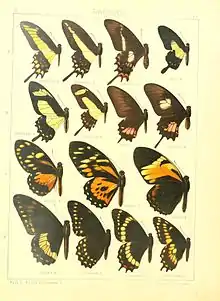Papilio garleppi
Papilio garleppi is a species of Neotropical butterfly in the family Papilionidae first described by Otto Staudinger in 1892. It is found in Bolivia, Brazil, French Guiana, Guyana, Peru, and Suriname.
| Papilio garleppi | |
|---|---|
 | |
| Scientific classification | |
| Domain: | Eukaryota |
| Kingdom: | Animalia |
| Phylum: | Arthropoda |
| Class: | Insecta |
| Order: | Lepidoptera |
| Family: | Papilionidae |
| Genus: | Papilio |
| Species: | P. garleppi |
| Binomial name | |
| Papilio garleppi Staudinger, 1892 | |
Description
The male is similar to Papilio torquatus, but the yellow band is broader and the marginal tooth of the first median of the hindwing is longer. There are two or three small spots composed of yellowish and bluish scales placed before the red anal spot of the hindwing. On the underside the posterior discal spot is placed at the second median is very small and bluish. The anal tergite is long and slender; harpe produced into a long point and furnished with a long pointed process at the ventral margin.[2]
Etymology
The species is named for the professional collector Gustav Garlepp.
References
- Grice, H.; Freitas, A.V.L.; Mielke, O.; Casagrande, M. (2018). "Papilio garleppi". IUCN Red List of Threatened Species. 2018: e.T15989A122599925. doi:10.2305/IUCN.UK.2018-2.RLTS.T15989A122599925.en. Retrieved 17 November 2021.
- Jordan, K. in Seitz, A. (1907). The Macrolepidoptera of the World. 5: The Macrolepidoptera of the American faunistic region. Papilionidae: 1-45.
External links
- Global Butterfly Information System images of syntypes in the Museum für Naturkunde, Berlin.
